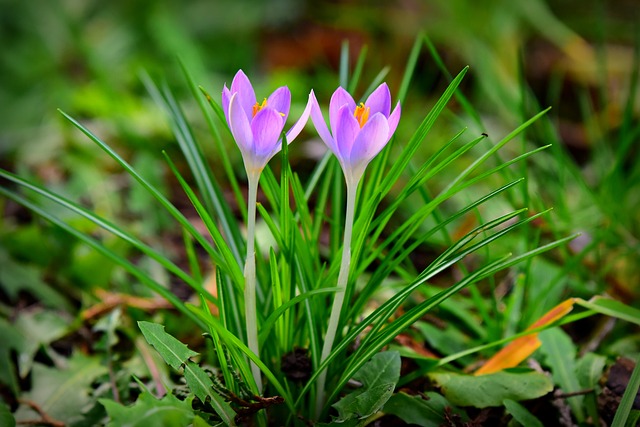
Growing your own organic garden can really give you a nutritional boost to your diet, but knowing what it takes can be difficult. As well, there are a lot of choices when it comes to seeds. Here are a few tips and techniques you can use to get started in your own organic garden.
Choose perennials that won’t be taken out by slugs. Snails and slugs can quickly wreak havoc on a garden. Snails and slugs like to eat perennials with smooth and thin leaves, especially if they are young plants. Slugs and snails will leave some perennials alone, particularly those with a bad taste or tough, hairy leaves. A few great choices are achillea, campanula, and heuchera. Other options from which you can choose are hellebourus and euphorbia.
Starting a garden with the best soil is a great defense mechanism against pests. Healthy and well-nourished plants will be hardier and therefore better able to prevent pests from taking hold. Use a high-quality organic soil and as few chemicals as possible.
Baking Soda
There is no need to purchase a costly chemical if your plants develop powdery mildew. All it takes is a liquid soap, water, and baking soda mixture. Spray this on the plants once per week until that mildew goes away. Baking soda treats the mildew effectively and gently and it won’t damage your plants.
All soil is not the same. You need to check the soil to make sure it’s the best for what you’re planting. You can actually get an analysis of soil for a little fee, and with the report you get back you can figure out how to create a vibrant garden by enriching it properly. There are numerous places to find this service, such as your local Cooperative Extension office. The cost is well worth it to avoid a potentially ruined crop.
If you are going to be doing some horticulture, watch out for stink bugs, especially in the fall! Stink bugs are attracted to tomatoes, beans and most fruits. Proper measures should be taken in order to ensure minimal damage to your crops.
Keep the weeds out of your garden by removing them regularly. Weeds can kill a precious garden. For this task, try using white vinegar. White vinegar can not only kill the weeds, it’s also a non-toxic spray that won’t harm pets or people. By placing a white vinegar solution in a spray bottle, you can spray the weeds away instead of having to pull them out manually.
Plant bulbs if you want spring and summer flowers. Planting and growing bulbs is very simple, and once planted the bulbs will grow for years. Different varieties of bulbs flower at varied times and if you make the right choices you can have blossoms from early spring through late summer.
Start Planting
The approach of fall means you need to start planting autumn goodies. Instead of a clay pot, show some fall spirit by using a hollow pumpkin to plant your lettuce or kale in. Once you’ve cut its top and scooped the insides out, spray the edges and inside with Wilt-Pruf to prevent rotting. You can start planting now.
Remember to place a layer of mulch over the soil around your vegetables, approximately 2 inches deep. The soil around plants can stay damper through the use of mulch. It also keeps weeds from growing. This can prevent you from having to constantly pull weeds.
If you are growing a vegetable garden, you may find that pests can be difficult to control. The vegetables are intended to be eaten, thus you should refrain from using harsh pesticides and chemicals. The key to keeping garden pests at bay is to be relentless. If you discover the pests when they first infest your plants, the best way to remove them is to pick them off manually.
When planting seeds, make sure to take your time. First, you should loosen the soil, and ensure that it is sufficiently moist. You may then distribute your seeds evenly while being sure that they all have adequate space in which to grow. The seeds should be buried to a depth that is equal to three times the diameter of the seeds. Also keep in mind that there are some seeds you should not bury, as light is essential for their growth.
Have your horticulture tools near you to minimize the time spent searching for them. Wear pants with multiple pockets or use a toolbox or large bucket. Keep common tools such as your gloves or your pruning shears within reach so that you can quickly and easily maintain your garden whenever you need to.
Organic fruits and vegetables grow without being exposed to pesticides and other chemicals. Although this is better for your health, you do need to check organic produce for infestation of bugs before eating it.
Grow some garlic that is organic. Garlic cloves should be planted in the spring or fall. They require soil that is well-drained and moist. Plant the cloves one to two inches beneath the soil about four inches apart and with the pointed end up. Green garlic shoots could be cut as it grows, and it can be used to substitute scallions or chives. You will know when to harvest the garlic, because the tops will gradually turn brown. Leave the bulbs out to dry and exposed to the sun for a few days so that the skin hardens a bit. Store them in a cool, dry location. You can store them as loose bulbs, or fasten them together into bunches.
Organic Garden
As was stated previously, growing your own organic garden can have an unbelievably positive effect on your eating habits, especially when you understand the sheer number of varying plants it is possible to grow. The tips in this article will set you on the right path to a successful organic garden, that provides healthy food for your family.